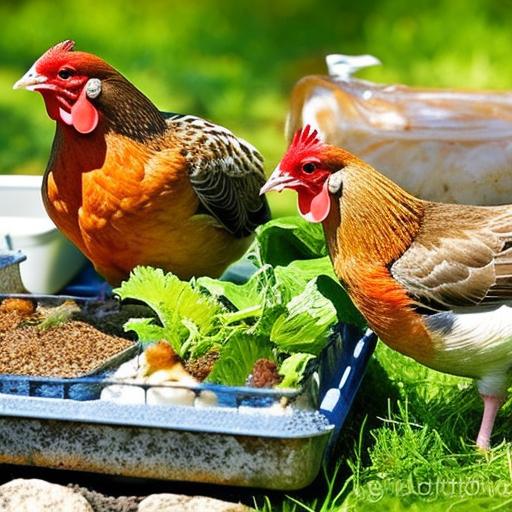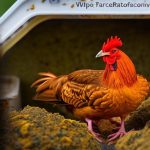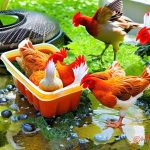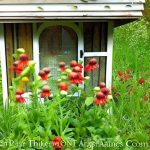Keeping chickens cool in the summer is crucial for their health and well-being. Chickens are susceptible to heat stress, which can have negative effects on their overall health and productivity. There are several ways to keep chickens cool, including providing shade, creating a cooling breeze with fans or misters, offering refreshing treats, adjusting feeding times, using natural remedies, maintaining clean and cool water sources, monitoring for signs of overheating, and preparing the coop for summer heat.
Key Takeaways
- Keeping chickens cool in summer is important for their health and well-being.
- Signs of heat stress in chickens include panting, lethargy, and decreased egg production.
- Providing adequate shade is crucial for keeping chickens cool.
- Fans or misters can create a cooling breeze for chickens.
- Offering refreshing treats and adjusting feeding times can help keep chickens hydrated and cool.
Understanding the Importance of Keeping Chickens Cool in Summer
Chickens are particularly susceptible to heat stress because they lack sweat glands and rely on panting to regulate their body temperature. When the temperature rises above 85 degrees Fahrenheit, chickens can struggle to cool themselves down effectively. Heat stress can have negative effects on chickens, including decreased egg production, reduced fertility, decreased growth rates, and even death.
Heat stress can also lead to dehydration in chickens. Dehydration occurs when chickens lose more water than they take in. This can happen when they pant excessively to cool down or when they don’t have access to enough water. Dehydration can be life-threatening for chickens and can lead to organ failure if not addressed promptly.
Identifying Signs of Heat Stress in Chickens
It’s important to be able to recognize the signs of heat stress in chickens so that appropriate measures can be taken to cool them down. Common signs of heat stress include panting, holding wings away from the body, lethargy, decreased appetite, pale combs and wattles, and diarrhea. Chickens may also seek out shady areas or lie down on cool surfaces in an attempt to cool themselves down.
Checking for dehydration in chickens is also crucial. To check for dehydration, gently pinch the skin on the back of a chicken’s neck. If the skin snaps back into place quickly, the chicken is adequately hydrated. If the skin takes longer to snap back or remains tented, the chicken is dehydrated and immediate action should be taken to rehydrate them.
Providing Adequate Shade for Your Flock
| Metrics | Description |
|---|---|
| Number of Shade Structures | The total number of shade structures provided for the flock. |
| Shade Coverage Area | The total area covered by the shade structures. |
| Shade Material | The type of material used for the shade structures (e.g. fabric, metal, wood). |
| Shade Placement | The location of the shade structures in relation to the flock (e.g. near water source, feeding area). |
| Shade Duration | The amount of time the shade structures are available to the flock each day. |
Providing shade is essential for keeping chickens cool in the summer. Shade helps to reduce the direct heat from the sun and provides a cooler area for chickens to rest and seek relief from the heat. Natural shade from trees or shrubs is ideal, but if that’s not available, you can create artificial shade using tarps, umbrellas, or shade cloths.
It’s important to ensure that the shade covers a significant portion of the chicken’s outdoor area and that it is positioned in a way that provides shade throughout the day as the sun moves. The shade should also be well-ventilated to allow for airflow and prevent heat from getting trapped underneath.
Creating a Cooling Breeze with Fans or Misters
Fans and misters can help create a cooling breeze for chickens and provide relief from the heat. Fans help to circulate air and can be placed strategically in the coop or outdoor area to create airflow. Misters, on the other hand, release a fine mist of water into the air, which evaporates and cools down the surrounding area.
There are different types of fans and misters available on the market. Box fans or pedestal fans can be used in the coop or outdoor area to create airflow. Misters can be attached to a hose or installed as a permanent fixture in the coop or outdoor area. It’s important to ensure that fans and misters are positioned in a way that chickens can access them easily but are not at risk of getting wet or injured.
Offering Refreshing Treats to Keep Chickens Hydrated

Offering refreshing treats can help keep chickens hydrated during hot summer days. Fruits and vegetables with high water content, such as watermelon, cucumbers, and lettuce, can provide a refreshing and hydrating snack for chickens. These treats can be offered in addition to their regular feed and should be provided in a way that allows chickens to peck at them throughout the day.
It’s important to note that treats should not replace their regular feed, as chickens still need a balanced diet to meet their nutritional needs. Treats should be offered in moderation and should not make up more than 10% of their overall diet.
Adjusting Feeding Times to Avoid the Hottest Parts of the Day
Adjusting feeding times can help chickens avoid the hottest parts of the day and reduce the risk of heat stress. Feeding chickens early in the morning or late in the evening, when temperatures are cooler, can help ensure that they have access to food without being exposed to excessive heat.
It’s important to monitor the feeding behavior of chickens and adjust feeding times accordingly. If chickens are not showing interest in their feed during the hottest parts of the day, it may be necessary to offer smaller, more frequent meals during cooler times.
Using Natural Remedies to Keep Chickens Cool
There are several natural remedies that can help keep chickens cool in the summer. One option is to add electrolytes to their water. Electrolytes help replenish essential minerals and nutrients lost through panting and sweating. They can be purchased as a powder or liquid and added to the chicken’s drinking water according to the manufacturer’s instructions.
Another natural remedy is to provide herbs with cooling properties, such as mint or lemon balm, in their coop or outdoor area. These herbs can be planted or placed in pots for easy access. Chickens may naturally seek out these herbs and consume them as needed.
Maintaining Clean and Cool Water Sources
Clean and cool water sources are essential for keeping chickens hydrated and cool in the summer. Chickens need access to fresh, clean water at all times, but it’s especially important during hot weather. Water should be changed frequently to ensure it remains cool and free from contaminants.
To keep water cool, you can add ice cubes or frozen water bottles to the water container. This will help lower the temperature of the water and provide a refreshing drink for chickens. It’s also important to ensure that water containers are placed in shaded areas to prevent them from heating up in the sun.
Monitoring Your Flock for Signs of Overheating
Monitoring chickens for signs of overheating is crucial to ensure their well-being. Regularly observe your flock for signs of heat stress, such as panting, holding wings away from the body, and lethargy. If you notice any signs of overheating, take immediate action to cool them down.
You can also monitor their behavior and feeding patterns. If chickens are not eating or drinking as usual, it may be a sign that they are experiencing heat stress. Additionally, monitor their droppings for any changes, as diarrhea can be a sign of heat stress or dehydration.
Preparing Your Coop for Summer Heat
Preparing your coop for summer heat is essential to create a comfortable environment for your chickens. Insulating the coop can help regulate the temperature and keep it cooler during hot weather. Materials such as straw, hay, or wood shavings can be used as insulation to help keep the coop cool.
It’s also important to ensure proper ventilation in the coop. Install windows or vents that can be opened to allow for airflow. This will help prevent heat from getting trapped inside the coop and create a more comfortable environment for the chickens.
Keeping chickens cool in the summer is crucial for their health and well-being. By providing shade, creating a cooling breeze with fans or misters, offering refreshing treats, adjusting feeding times, using natural remedies, maintaining clean and cool water sources, monitoring for signs of overheating, and preparing the coop for summer heat, you can ensure that your chickens stay cool and comfortable during hot weather. Take action to implement these strategies and prioritize the well-being of your flock.
If you’re a chicken owner, you know how important it is to keep your feathered friends cool during the hot summer months. Luckily, there are plenty of ways to ensure their comfort. One helpful resource I found is an article on Poultry Wizard titled “How to Keep Chickens Cool in Summer.” This article provides valuable tips and techniques for creating a cool and comfortable environment for your chickens, including proper ventilation, shade options, and hydration strategies. If you want to learn more about keeping your chickens cool this summer, check out the article here.
FAQs
What temperature is too hot for chickens?
Chickens can start to experience heat stress at temperatures above 85°F (29°C).
How can I keep my chickens cool in the summer?
You can keep your chickens cool in the summer by providing shade, plenty of fresh water, and good ventilation in their coop. You can also give them frozen treats or add electrolytes to their water to help them stay hydrated.
What kind of shade is best for chickens?
Natural shade from trees or shrubs is ideal for chickens, but you can also provide artificial shade with tarps or umbrellas. Just make sure the shade covers the entire area where the chickens spend their time.
How often should I change my chickens’ water in the summer?
You should change your chickens’ water at least once a day in the summer, and more often if it gets dirty or warm.
What are the signs of heat stress in chickens?
Signs of heat stress in chickens include panting, lethargy, loss of appetite, and a drop in egg production. In severe cases, chickens may collapse or die.
Can I use a fan to cool my chickens?
Yes, you can use a fan to cool your chickens, but make sure it’s placed in a way that provides good ventilation without blowing directly on the chickens.
Should I give my chickens ice water in the summer?
No, you should not give your chickens ice water in the summer. Cold water can shock their system and cause them to stop drinking altogether. Instead, provide cool, fresh water and add electrolytes if necessary.
What breeds of chickens are best suited for hot climates?
Breeds of chickens that are best suited for hot climates include Leghorns, Rhode Island Reds, and Sussex. These breeds are known for their heat tolerance and ability to lay eggs in hot weather.
Meet Walter, the feathered-friend fanatic of Florida! Nestled in the sunshine state, Walter struts through life with his feathered companions, clucking his way to happiness. With a coop that’s fancier than a five-star hotel, he’s the Don Juan of the chicken world. When he’s not teaching his hens to do the cha-cha, you’ll find him in a heated debate with his prized rooster, Sir Clucks-a-Lot. Walter’s poultry passion is no yolk; he’s the sunny-side-up guy you never knew you needed in your flock of friends!







